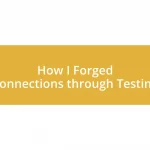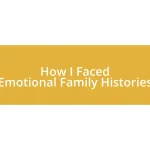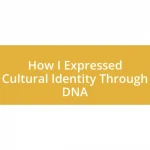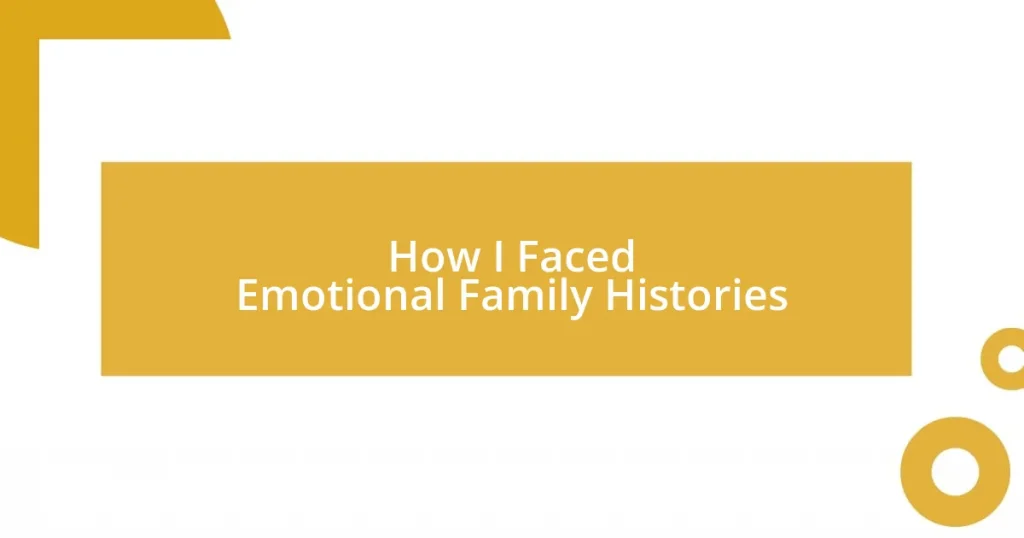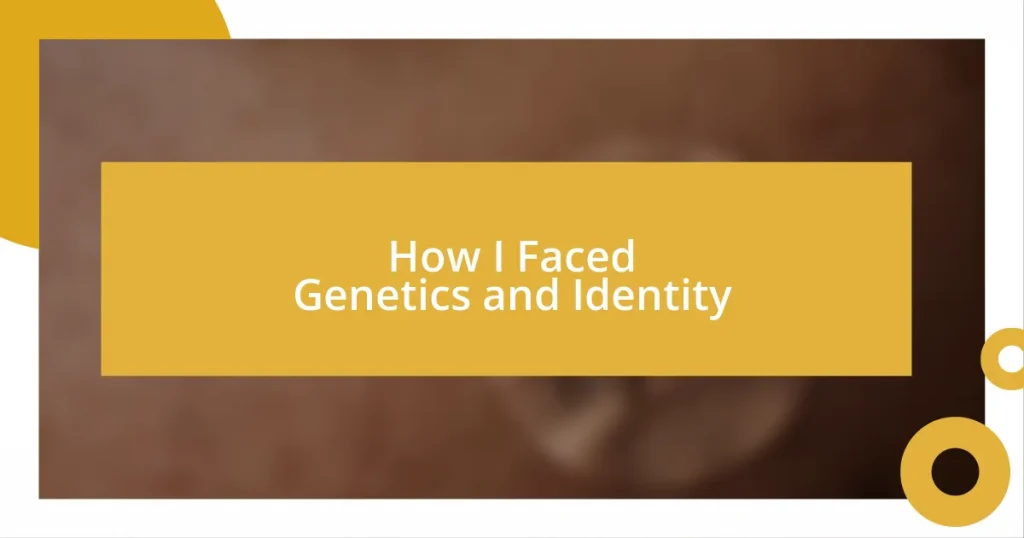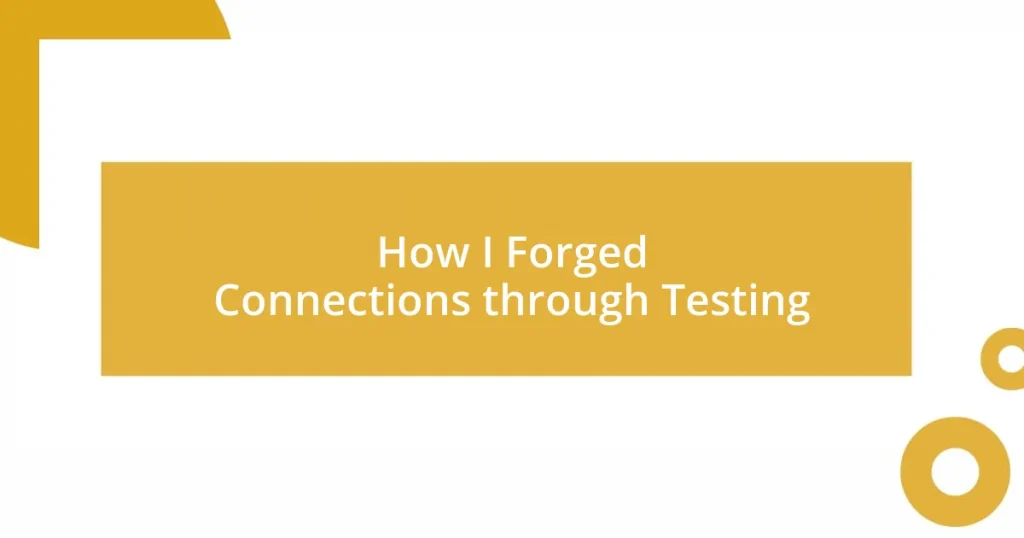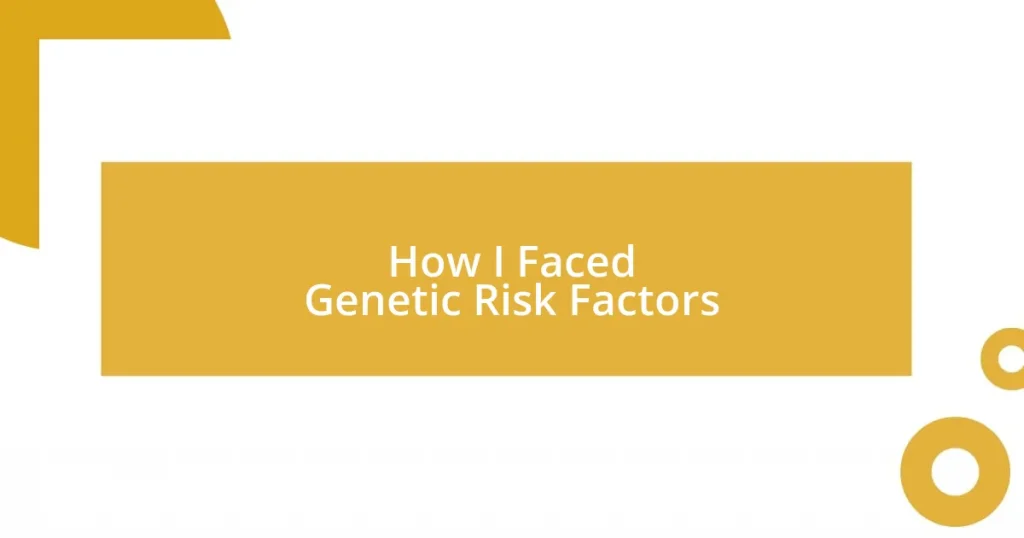Key takeaways:
- Emotional family histories shape individual behavior and responses, often influencing decision-making and relationships across generations.
- Identifying personal emotional triggers linked to family dynamics can lead to greater self-awareness and healthier emotional responses.
- Effective communication strategies, such as active listening and using “I” statements, are essential for fostering understanding in emotionally charged family discussions.
- Building healthy family relationships involves openness and vulnerability, with regular check-ins enhancing connection and trust among family members.
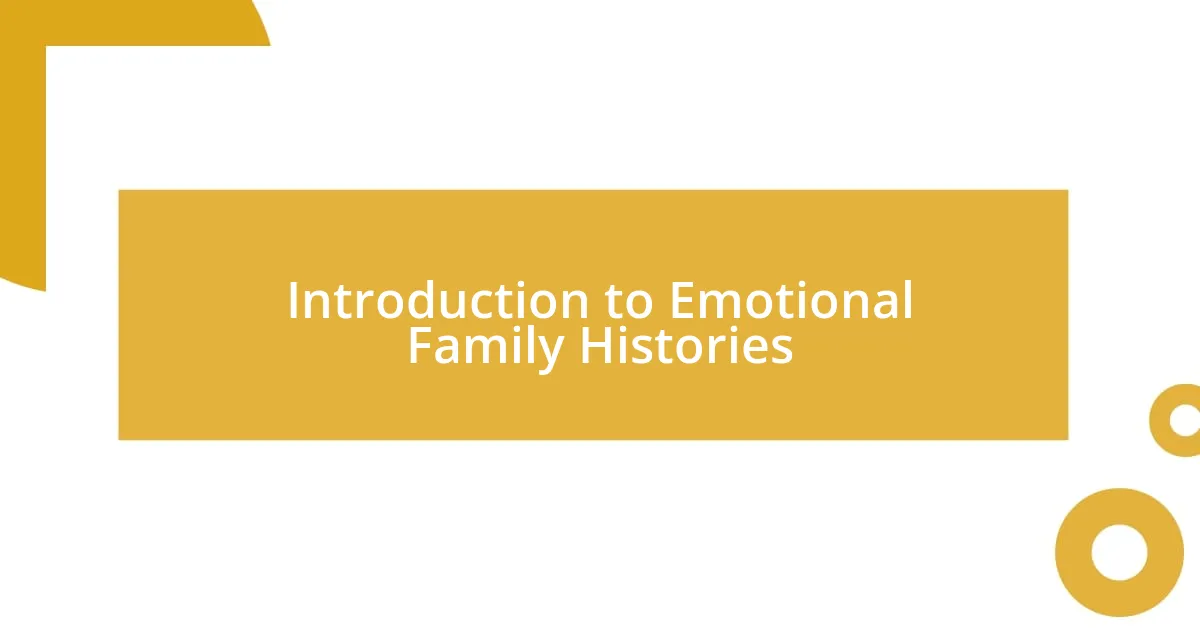
Introduction to Emotional Family Histories
Family histories are often emotionally charged, weaving a complex tapestry of experiences, memories, and patterns that shape who we are. I remember discovering some unexpected family secrets that shifted my perspective on my own life. Have you ever felt like certain patterns in your family were almost like invisible weights you carried, influencing your decisions and relationships?
When I started to dig deeper into my family’s past, I realized how significant events and emotional scars could affect multiple generations. It’s fascinating how our parents’ struggles and triumphs can reverberate through time, impacting our emotional well-being and resilience. Do you find yourself reacting to situations in ways that mirror your parents or grandparents?
Understanding emotional family histories isn’t just about uncovering facts; it’s about healing and growth. As I confronted these inherited feelings, I recognized moments of joy and pain that defined my family—often leading me to question how I could break cycles or honor their legacies. It’s a profound journey that invites reflection, understanding, and ultimately, transformation.
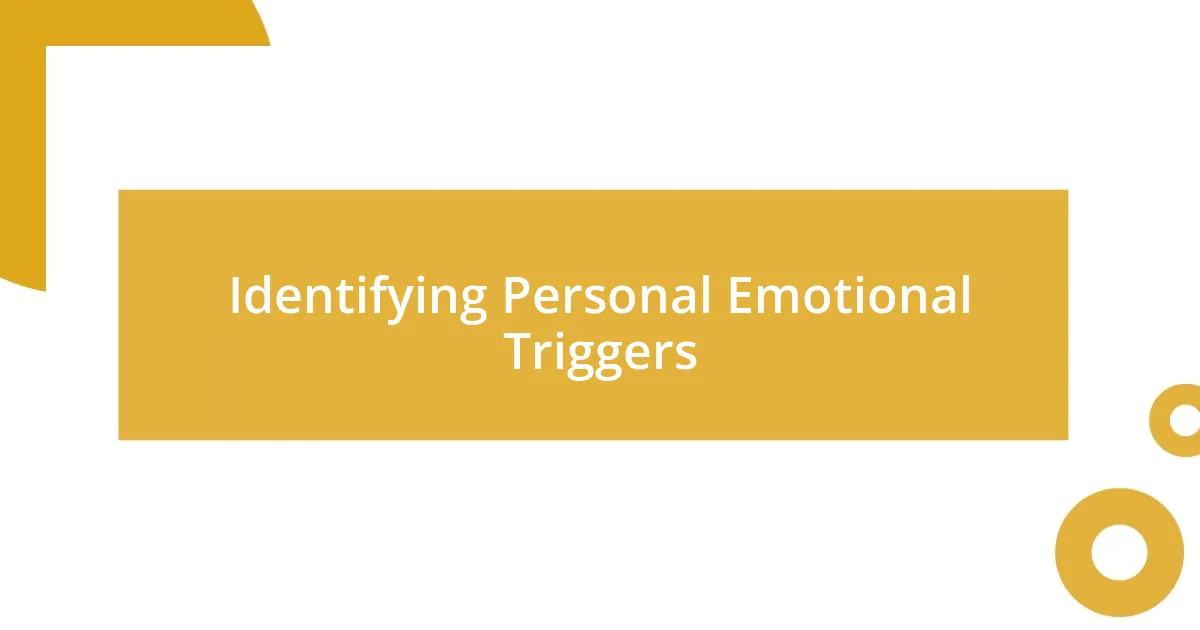
Identifying Personal Emotional Triggers
Identifying personal emotional triggers is a crucial step in understanding how our family histories affect us. For instance, I often found myself feeling anxious at family gatherings, overwhelmed by a wave of emotions I couldn’t quite place. It took time for me to realize that specific comments from relatives about my career choices reminded me of my dad’s disapproval when I first pursued my passion, sparking that deep-seated anxiety. It was a revelation, helping me connect the dots between my emotional triggers and their roots in my family’s past.
A notable experience happened when I noticed I reacted defensively during conversations that shifted towards ambition. Initially, I thought it was just my personality, but upon reflection, I understood it stemmed from my mother’s constant comparisons of my achievements to those of my cousins. This realization was empowering; it allowed me to respond thoughtfully, rather than be swept away by my emotions. Recognizing where my triggers stemmed from not only fostered self-awareness but also helped me navigate relationships more compassionately.
I encourage you to reflect on moments that evoke strong emotional responses. Are there times where you feel disproportionately sad, angry, or anxious? Mapping these emotions to events, comments, or even family dynamics can be revealing. I have found journaling to be a valuable practice, allowing me to articulate my feelings and connect them to specific family stories. Each entry becomes a tool for understanding and recognizing my triggers, ultimately leading to healthier emotional responses.
| Emotional Trigger | Possible Family Connection |
|---|---|
| Career Anxiety | Father’s disapproval of my passion |
| Defensive during ambition discussions | Mother’s comparisons to cousins |
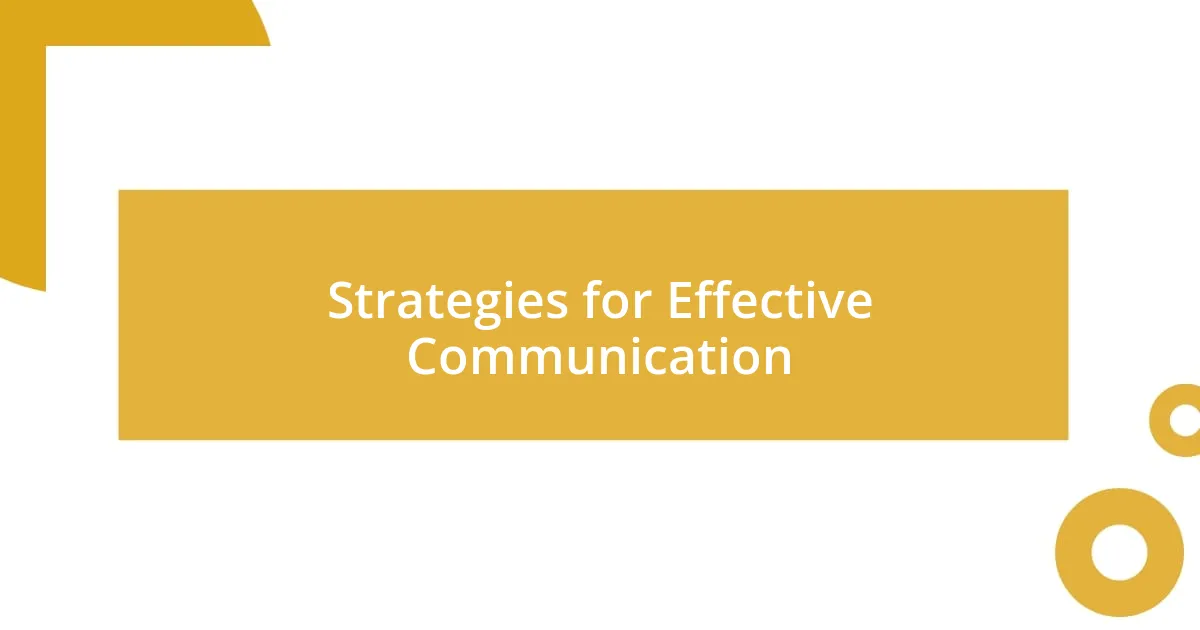
Strategies for Effective Communication
Communication within a family laden with emotional histories can be delicate. From my experience, I’ve found that approach matters immensely. For example, choosing the right moment to discuss sensitive topics is key. It’s like waiting for the perfect time to plant a seed; you want it to flourish rather than wither under harsh conditions.
Here are some strategies that can enhance effective communication in emotionally charged situations:
-
Active Listening: Focus entirely on what the other person is saying without thinking about your response. I often catch myself planning my reply instead of absorbing the message, but by practicing active listening, I’ve uncovered deeper insights into my family’s feelings.
-
Use “I” Statements: Framing your feelings with “I” statements can lower defensiveness. For example, instead of saying “You always dismiss my feelings,” try “I feel hurt when my emotions are overlooked.” I’ve noticed such shifts can lead to more constructive conversations.
-
Stay Calm and Grounded: Before engaging in a dialogue, take a moment to breathe and center yourself. I once entered a discussion heated and frustrated, and it transformed into a cycle of blame. Learning to pause has made a world of difference.
-
Establish Boundaries: Sometimes, it’s necessary to set clear limits on what topics are off-limits until everyone is ready. I remember creating a safe space for sharing, which grew over time as trust deepened within my family.
-
Seek Professional Help: When discussions become overwhelming, consider counseling. I’ve seen how the guidance of a trained professional can facilitate healthier conversations, especially when emotions run high.
It’s amazing how the right strategies can open up pathways for clarity and connection, transforming what could be painful discussions into opportunities for understanding and healing.
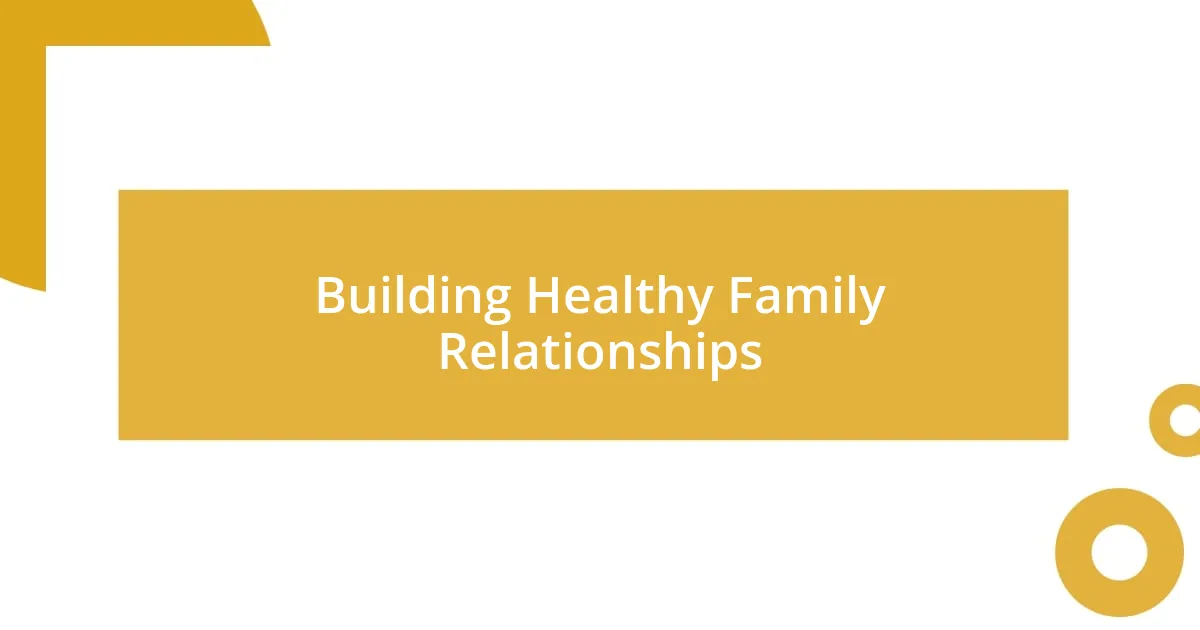
Building Healthy Family Relationships
Building healthy family relationships requires a delicate balance of openness and vulnerability. I remember one family gathering where I decided to share not just my successes, but also my struggles. It was nerve-wracking, but the flood of understanding and support that followed was incredibly rewarding. Sharing those moments honestly made me realize how powerful vulnerability can be in fostering deeper connections.
Establishing trust within family interactions is fundamental. I learned this the hard way during an argument about holiday plans. Instead of escalating into frustrations, I took a step back, recalling how my family thrives on teamwork. By suggesting we collaborate on decision-making, I witnessed how quickly tension dissolved into laughter and brainstorming. Isn’t it remarkable how a little shift in perspective can transform a seemingly mundane discussion into a bonding experience?
Moreover, I found that scheduling regular family check-ins can be a game-changer. It might sound formal, but we decided to set aside a monthly lunch just to chat without the pressure of problem-solving. Initially, I worried it might feel forced, yet sharing food created a relaxed atmosphere. Over those meals, we tackled everything from goofy anecdotes to more serious topics, and it has enriched our connections profoundly. Have you ever tried simply having open conversations sans agenda? You might find unexpected insights that bring you even closer together.

